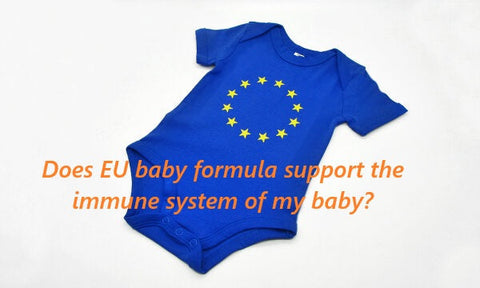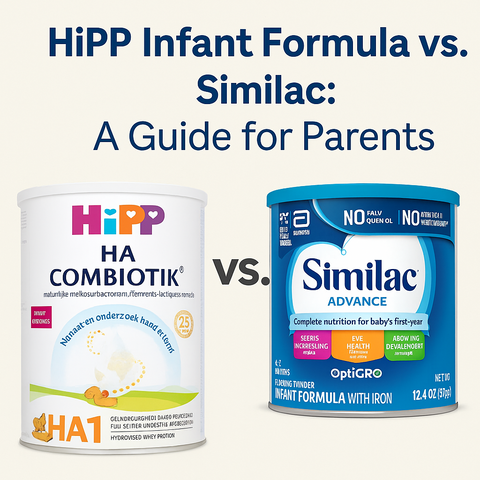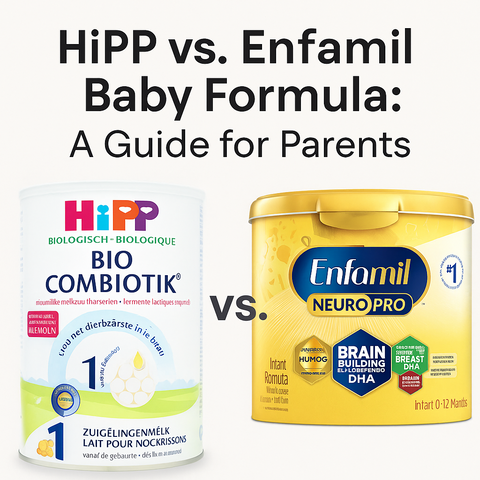HiPP Dutch vs. German vs. UK Organic Formulas
Many parents ask us the same questions about the different Hipp Versions.
- "What is the difference between HiPP Dutch, German, and the UK version?"
- "Aren’t they all the same because they come from the same manufacturer and the E.U.?"
- "Is it the same formula in different packaging for each country?"
We’ll answer all these questions and more for you in this article.
Firstly, regardless of your chosen version, rest assured that all HiPP formulas are certified organic by the European Food Safety Authority (EFSA). This guarantees that all HiPP Formulas are free from GMOs, refined sugars like corn syrup, artificial preservatives, pesticides, and hormones. HiPP's commitment to clean organic ingredients from farms prioritizing animal welfare and environmental sustainability proves their dedication to your baby's nutrition. Among their signature Bio Combiotic certified organic formula range, the German, Dutch, and UK versions are some of the most sought-after. Each of these formulas has its unique qualities, and as a parent, it's essential to understand the differences to make an informed choice.
This blog will delve into the ingredients these formulas contain, explain why these variations exist, and answer where the formulas are produced and packaged.
Why are there different formulas for different counties, and what sets them apart?

Well, it's an excellent question with a relatively straightforward explanation. To ensure parents can access organic milk that suits their baby's needs, HiPP adapts its formulas according to country-specific preferences and legal regulations. For example, HiPP UK baby formula strives for complete nutrition for strong baby development, including a Combiotic Line that helps lactose intolerant babies. The UK Stage 1 and Stage 2 formulas are in 800gr boxes, and Stage 3 is in 600gr packaging, all with English Labeling (what a surprise! ;) ). The HiPP Dutch line comes in 800-gr cans with Dutch labeling, while HiPP German comes in 600-gr carton boxes with German labeling. Note: We have a translated label for each formula we carry, which you can find here. There are specific needs that manufacturers must meet for each country’s demographic, but all strive toward maintaining baby nutrition. Additionally, each country must meet and deliver specific country marketing needs.
What set these three formulas apart?
The main differences in ingredients between HiPP German, Dutch, and UK are in the addition (or not) of starch and probiotics.
Ingredients
All of these HiPP formula versions have quite a lot in common. They are nutritionally complete formulas that contain organic skim milk, organic whey, organic lactose, vegetable oils, prebiotics, essential vitamins & minerals, omega-3 & omega-6 fatty acids, and much more. They are all free from GMO ingredients, gluten, refined sugars, syrup, and synthetic nutrients and preservatives. Best of all, they are all certified organic to the stringent rules set by the EFSA.
Check out this comparison chart of the HiPP Formulas, which can be found here.

Variations in Starch
HiPP formulas are designed to mimic breast milk, offering your little one a formula that's as close to nature as it gets. All HiPP formulas contain lactose, the primary carbohydrate source in breast milk. Lactose is a natural milk sugar that plays a crucial role in providing energy for babies and promoting the growth of beneficial gut bacteria.
Starch-free formulas Organic Formula Shop carries that rely solely on lactose include:
- HiPP German Stage PRE Infant Formula
- All HiPP Dutch formulas
- All HiPP UK formulas
HiPP's German formula line introduces starch as a secondary carbohydrate in Stages 1, Stage 2, and Stage 3. Some parents prefer starch-free formulas to closely mimic breast milk, while others choose them due to misconceptions about babies' ability to digest complex carbohydrates like starch.
Research from 1975 demonstrated that even very young babies (1-3 months old) can digest starch efficiently. Babies given starch were found to digest over 99% of it, with undigested starch undergoing microbial fermentation in the colon. This process produces short-chain fatty acids, aiding nutrient absorption, promoting gut health, and providing an additional energy source.
Starch is a complex carbohydrate composed of multiple glucose molecules and takes longer to digest, preventing blood sugar spikes. Some babies may prefer the creamier texture that starch adds to the formula, making them more satisfied after feedings.
Variations in Prebiotics & Probiotics
Prebiotics are a core ingredient in all of the HiPP German, Dutch, and UK formulas and take the form of galactooligosaccharides (GOS), a prebiotic fiber derived from organic lactose. GOS, naturally occurring in breast milk, supports healthy intestinal flora by nourishing beneficial gut bacteria and promoting a balanced gut microbiome.
Both HiPP German and Dutch formulas even include both probiotics and prebiotics. HiPP German, Dutch, and UK versions feature prebiotics. Probiotics, the “Swiss Army Knife” of the microbial world, boost immune response, prevent eczema, and reduce colic. Even some indications indicate that probiotics can reduce the risk of allergies and asthma, though the evidence isn’t yet conclusive. In HiPP formulas, you'll find lactobacillus fermentum hereditum®, natural probiotic lactic acid cultures originally sourced from real breast milk.
Do HiPP Formulas contain Soy?
There are misconceptions about soy in HiPP formulas, primarily caused by some blogs online stating that lecithin is used in HiPP German stages 2 and stage 3. This lecithin is often mistaken for soy-derived lecithin, but it's not the case. HiPP's lecithin is organic sunflower lecithin, not soy-derived.
Lecithin is commonly used in baby formula to stabilize and thicken the milk. While seeing "emulsifier lecithin" might raise concerns, organic sunflower lecithin poses no harm. It is naturally found in sunflowers and other foods and has nutritional benefits. Sunflower lecithin contains essential vitamins and minerals, is GMO-free, and is low in allergens, making it an ideal choice for baby formula.
Research suggests regular lecithin consumption may enhance digestion, improve brain function, benefit skin health, lower cholesterol, and support breastfeeding. Natural lecithin, such as sunflower lecithin, is safe for consumption and does not pose health risks. For parents seeking soy-free organic formulas, you're guaranteed that all HiPP Bio Combiotic formulas, including the German version, are soy-free!
Variations in Folate
Folate, an essential nutrient in breast milk, is significant in promoting growth, cellular function, and DNA and RNA synthesis. While all HiPP Dutch, UK, and German formulas contain folate, HiPP German uses Metafolin® as the source, while the Dutch and UK versions use folic acid.
Metafolin® is a naturally occurring, bioavailable form of vitamin B9, unlike synthetic folic acid. The key thing to know here is that folic acid is like folate’s synthetic twin, except it’s less beneficial to our bodies because folic acid is produced industrially, and before our bodies can absorb and use it, we have to convert it into folate. HiPP's entire formula range (German, Dutch, and UK) is all made according to strict nutritional standards set out by the EU, and as such, all are valuable and important sources of folate for your newborn!
Variation in Packaging
HiPP is committed to reducing its environmental impact. They operate climate-neutral production plants in Europe and strive for sustainable packaging options. HiPP utilizes minimal and recyclable materials, making their products highly recyclable. Their folding boxes (used for German and UK formulas) boast lower CO2 emissions than tin cans (used for Dutch formulas). Additionally, the graphics on these boxes are printed using vegetable oil-based ink free of mineral oil.
The cardboard used for these boxes is Forest Stewardship Council® (FSC®)-certified, indicating responsibly sourced wood fiber for paper production. HiPP Dutch formulas come in 800g tin cans, while HiPP German is packed in 600gr, and the UK formulas are packed in 800gr and 600gr FSC®-certified paper boxes.
Which formula is made where?
All HiPP baby formulas, including Dutch and UK versions, are manufactured and labeled in Germany. The only difference is that the HiPP German receives German labels, while HiPP Dutch and UK are packaged with Dutch and English labeling.
The EU maintains rigorous organic standards for formula compared to the US, and HiPP exceeds EU organic standards to provide the highest quality milk for your baby. They source milk exclusively from farms adhering to organic farming guidelines, where cows graze freely in pesticide-free meadows. Strict quality checks are conducted after milk harvest, surpassing legal requirements.
Independent institutions subject their products to testing for over 1000 harmful substances, ensuring that HiPP formulas are free of GMOs, artificial colors, preservatives, and flavor enhancers like corn syrup. HiPP's unwavering commitment to the quality of organic milk and high safety standards distinguishes their Bio Combiotic formulas as some of the best available.
Conclusion
In summary, the German, Dutch, and UK versions of HiPP baby formulas may have slight variations to meet regional preferences and regulations. However, the core principles of organic, nutritious, and reliable formulas run consistently across all HiPP products. Parents can confidently choose any HiPP formula, knowing they provide their babies with high-quality, certified organic nutrition. Each version offers exceptional choices for nourishing your baby, and the decision ultimately depends on your specific preferences and needs.
Contact
Contact our dedicated customer support team for expert advice and guidance tailored to your baby's needs. They have earned hundreds of 5-star reviews from our customers, helping you to provide the best nutrition for your little one. Contact us here or shoot us an email at support@organicformulashop.com. We're here to help!
Disclaimer: This Article is not medical advice. Always consult your healthcare provider for personalized guidance.




